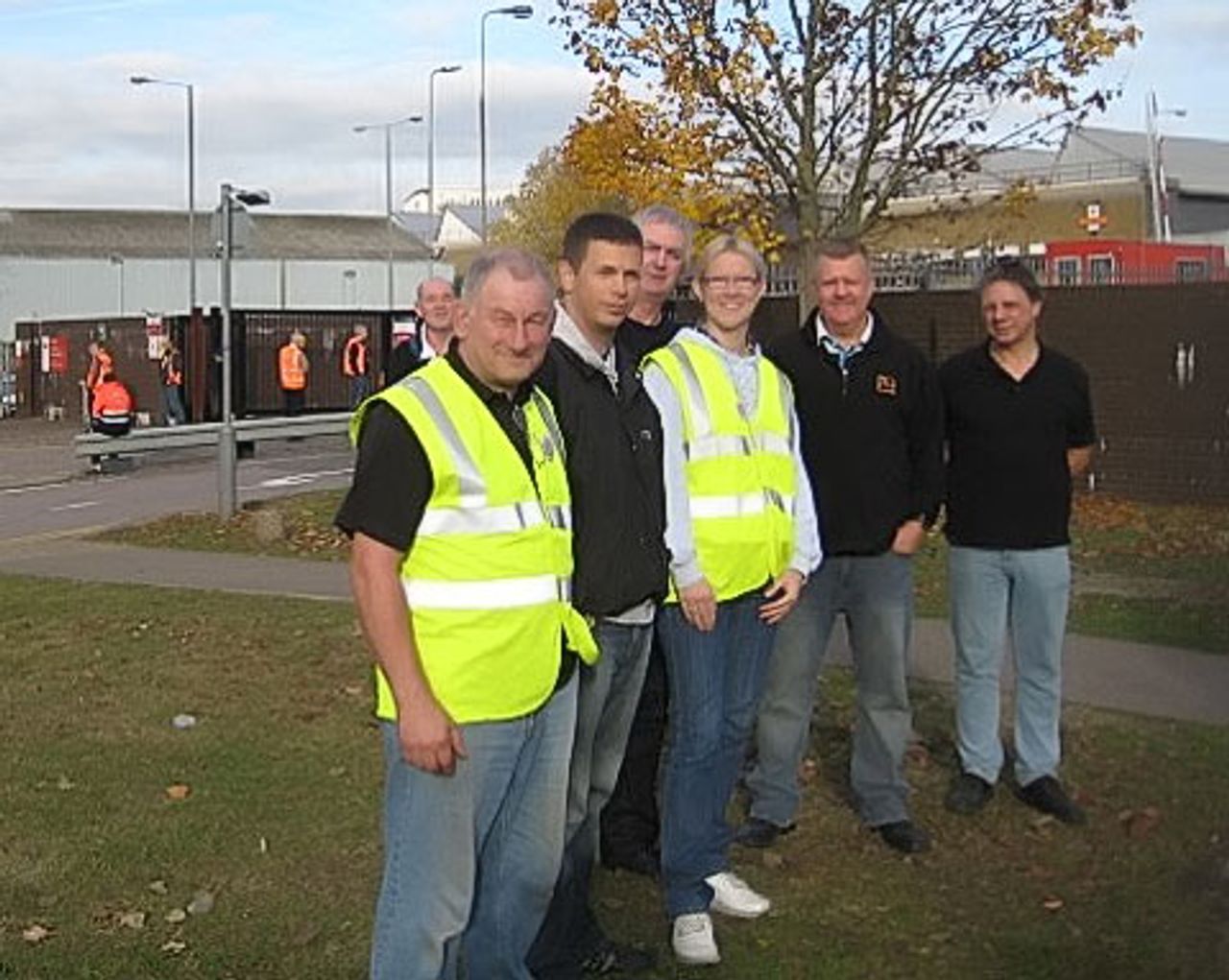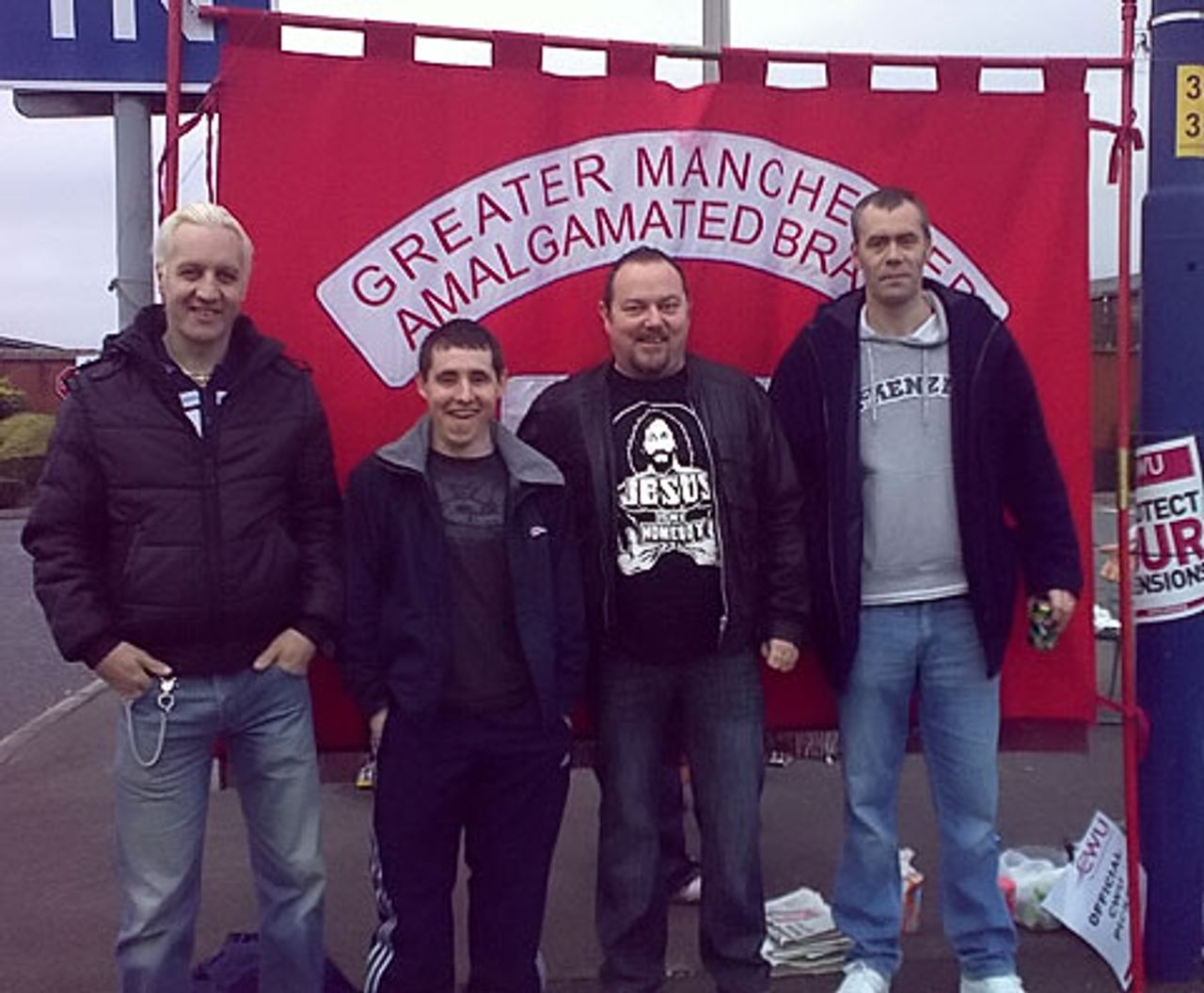Yesterday saw the start of three more days of postal strikes after days of talks between leaders of the Communication Workers Union (CWU) and Royal Mail, under the chairmanship of Trades Union Congress General Secretary Brendan Barber failed to broker a deal.
This week’s strikes involved 43,700 staff in mail centres, delivery units in mail centres, network logistic drivers and garage staff yesterday; just 400 workers at three sites in Plymouth, Stockport and Stoke, who assist mail centres by reading and entering mail addresses today; and 77,000 delivery and collection staff across the UK tomorrow.
Royal Mail managing director, Mark Higson, praised Barber and the TUC’s efforts to sell out the strike, stating, “We had made huge progress with the help of the TUC when the CWU came back from their executive meeting with a whole new series of demands.”
In reality, the CWU has made abundantly clear that it is desperate for a settlement with Royal Mail. The problem was that any “progress” made by the TUC must have been so detrimental to postal workers that the CWU believed it would not be swallowed by its members.
Dave Ward, the Communication Workers Union deputy general secretary, said that the CWU had “tabled a proposal as part of the process that reflected the progress made in negotiations over the last few days.” He told the BBC that “we waited some eight hours for Royal Mail to respond to that proposal.” Ward then again offered to call off the “series of strikes and future strikes” at any time and pledged, “We remain committed to reaching an agreed resolution.”
Whatever talks may be held, Royal Mail goes into the dispute wanting to inflict as decisive a defeat as possible on postal workers in order to ram through job losses, wage cuts and further speedups in preparation for privatization. And they are being backed to the hilt by the Labour government, which is seeking to send a message to other workers in the public and private sector that tens of billions in cuts cannot be resisted. The TUC’s role is to conceal these unswerving aims and demobilize postal workers by holding out the illusion that a compromise can be reached.
Meanwhile enormous resources are being pumped into a strike-breaking operation. According to press reports, Royal Mail have opened five “super” depots manned from amongst the 30,000 temporary recruits who are being trained to sort mail and operate complex mail sorting machines. These are non-union sorting depots on minimum wage. Employment agencies Manpower Services and Reed, alongside Royal Mail, recruited the scab force, interviewing sometimes three at a time.
The location of these super depots was a closely guarded secret. The first was exposed by a young worker at the Dartford super depot who, initially unaware of its purpose, was fired for taking photographs inside the warehouse. Two other depots have been identified, Wellingborough in the Midlands and Bristol in the southwest. They are also staffed by managers bussed in to do “front line” operations.
The location of the depots is determined by Royal Mail’s political calculation that the strike is being spearheaded by a number of more militant areas that must be broken. The Financial Times October 27 noted that Royal Mail has argued that “the dispute is being driven by resistance in the capital and just a handful of militant areas, including Bristol, parts of the Midlands, Glasgow and Edinburgh.”
The only action taken by the CWU against Royal Mail’s scabbing operation is a legal challenge to force the government to close the super depots, saying it is against the law to hire workers to do the job of another worker engaged in lawful industrial action. No attempt has been made to picket the “super” depots or to seek solidarity action. Betraying the CWU’s readiness to compromise even the most basic interests of its members, Ward said following the negotiations that Royal Mail’s scab-herding was “not a sticking point, but it is an issue.”
Private post operator TNT has also offered its services to the government as a strike-breaker. According to press reports, TNT is preparing to hire a further 30,000 workers for this purpose.
Reporters from the World Socialist Web Site spoke to postal workers at a number of depots.
 Watford pickets with managers escorting in scabs in background
Watford pickets with managers escorting in scabs in backgroundAt Watford, Hertfordshire some 15 managers lined the entrance to the depot escorting vans driven by managers and agency workers into the centre. Even though our reporter agreed to their request not to take photographs they called the police, claiming they felt intimidated.
Derek recounted how the situation facing post workers was something happening internationally: “Everywhere it seems they want to do away with any contracts of employment and want workers to come in whenever they are needed. Then they want to cut welfare, condemning people to even more poverty. Tony Blair and the Labour Party kept on saying about the Third Way [between capitalism and socialism] but you can’t have a bit of both.”
At Nine Elms mail centre, which sorts most of the mail from south London, Tony explained how postal workers were involved in a second day of national strike action but those in London were on their seventeenth day of action.
“I’m earning less than I was earning 10 years ago,” he said, “Everyone knows this business is going down the pan. And that privatisation will be compulsory next year. Come the general election next year whoever gets in will come at us with privatisation. I wish we were like the French. If they have a dispute the whole country comes out. We’re split up into little pockets. We have to be all as one now.
“Manpower agency people have been working here beside us, probably on a three-month contract, on about £5.75 an hour as a way of the company getting around the strike. They are the ones driving past the picket line. We know of at least five places including Dartford and West Wycombe where the Royal Mail are training people to do post workers jobs.
“I’ve been to meetings where they keep saying they will stop the political fund to the Labour Party, but it never seems to happen. No one says what they will do with it… I don’t think people are going to vote Labour. I would never vote for a Tory government, but I can’t vote for a Labour one either. We need some sort of alternative. We need it.
“If it comes to Christmas and the union backs down then I am finished with them. I am very passionate about workers getting what they deserve. If the union backs down over this we will walk out. We won’t be in it any more.”
 Pickets in Manchester
Pickets in ManchesterAt the Manchester Mail Centre on Oldham Road Jackie said, “I think we need to expand this strike so our workers are all out at once. Some of the drivers here today are on strike and they have to go back on Saturday and have to pick up mail from our CDO [Central Delivery Office], so they have to cross that picket line as well. And that is everywhere—not just here.
“This strike is all about Royal Mail putting too much work on us and there is not enough time. We have more and more work and less staff. Some days you don’t even have a break.
“Lord Mandelson is saying we have to accept the changes but we can’t accept them, can we? We need more workers and it’s as simple as that. There is just too much pressure on everyone. And that is why you have people going sick all the time—because they just can’t handle it. And then those workers are getting sacked.”
At Sheffield Mail Centre, Brightside, Paul said, “I think the main issues in the dispute are the threat of casualisation and the fact we have had no pay rise for two years. There’s a lot of executive management action taking place, riding roughshod over past agreements.
“There are people who have worked here 10 years, who should get a guaranteed level of pay and guaranteed hours, but management are just arbitrarily imposing new conditions. As full-time workers leave, they are replaced by part-timers.
“Mandelson, who is calling for the post to be ‘modernised,’ is the same minister that put forward the privatisation proposals. He’s laying the groundwork for a future government to implement full-scale privatisation of the post.
“This government is no different from previous governments in attacking working people. The union sponsors Labour MPs, but I understand there has been a recent ballot in London on this and there was overwhelming backing to end support for the Labour Party. I think it is about time we had a national ballot on that issue.
“We know that where there’s been a lot of privatisation, such as in Denmark, Germany and Scandinavia, conditions have deteriorated and the number of postal workers employed has gone down and there is greater casualisation. I know that recently postal workers in the United States have also faced massive attacks. We’re not in this on our own, it’s happening all over.
“There’s a need for more joined up action by public sector workers. It’s absolutely crazy that you have bin workers in Leeds taking action, bus workers in Sheffield and council workers here under attack, facing massive pay cuts. What we need is a public sector alliance to fight the attacks. We should all be on strike together.”
Dave Rowley, the CWU unit rep and assistant branch secretary, said, “This dispute goes back to 2007, when we went on strike over pensions, pay and conditions. Unfortunately, the TUC got involved and the union accepted it. This introduced a rolling programme of changes, mainly based on savings. It means a lot of early voluntary redundancies.
“I can’t see a resolution to this dispute in the short term. The rank and file views differ from the union bureaucracy, many of whom are on enormous salaries. We want our pensions sorting out, and we’ve had a wage freeze.
“We have had a campaign here to stop paying the political levy to the Labour Party, and here in the Mail Centre, where there are over 600 people, hardly anyone pays the political levy because they’re so disgusted with the Labour Party.”
